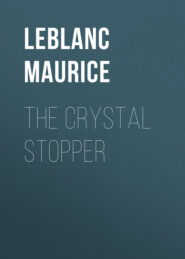По всем вопросам обращайтесь на: info@litportal.ru
(©) 2003-2025.
✖
813
Настройки чтения
Размер шрифта
Высота строк
Поля
"Take five men with you.. the same men, as you're sure of them. Don't leave this.. gentleman until to-morrow morning." He looked at his watch. "Until to-morrow morning at ten o'clock. No, I will give him till twelve. You will go wherever he thinks fit to go, you will do whatever he tells you to do. In short, you are at his disposal. At twelve o'clock, I will join you. If, at the last stroke of twelve, he has not handed me the bundle of letters, you will put him back in your car and, without losing a second, take him straight to the Santé Prison."
"If he tries to escape.."
"Take your own course."
He went out.
Lupin helped himself to a cigar from the table and threw himself into an easy chair:
"Good! I just love that way of going to work. It is frank and explicit."
The count had brought in his men. He said to Lupin:
"March!"
Lupin lit his cigar and did not move.
"Bind his hands," said the count.
And, when the order was executed, he repeated:
"Now then, march!"
"No."
"What do you mean by no?"
"I'm wondering."
"What about?"
"Where on earth that hiding-place can be!"
The count gave a start and Lupin chuckled:
"For the best part of the story is that I have not the remotest idea where that famous hiding-place is nor how to set about discovering it. What do you say to that, my dear Waldemar, eh? Funny, isn't it?.. Not the very remotest idea!."
CHAPTER XII
THE EMPEROR'S LETTERS
The ruins of Veldenz are well known to all who visit the banks of the Rhine and the Moselle. They comprise the remains of the old feudal castle, built in 1377 by the Archbishop of Fistingen, an enormous dungeon-keep, gutted by Turenne's troops, and the walls, left standing in their entirety, of a large Renascence palace, in which the grand-dukes of Zweibrucken lived for three centuries.
It was this palace that was sacked by Hermann II.'s rebellious subjects. The empty windows display two hundred yawning cavities on the four frontages. All the wainscoting, the hangings and most of the furniture were burnt. You walk on the scorched girders of the floors; and the sky can be seen at intervals through the ruined ceilings.
Lupin, accompanied by his escort, went over the whole building in two hours' time:
"I am very pleased with you, my dear count. I don't think I ever came across a guide so well posted in his subject, nor – which is rare – so silent. And now, if you don't mind, we will go to lunch."
As a matter of fact, Lupin knew no more than at the first moment and his perplexity did nothing but increase. To obtain his release from prison and to strike the imagination of his visitor, he had bluffed, pretending to know everything; and he was still seeking for the best place at which to begin to seek.
"Things look bad," he said to himself, from time to time. "Things are looking about as bad as they can look."
His brain, moreover, was not as clear as usual. He was obsessed by an idea, the idea of "the other one," the murderer, the assassin, whom he knew to be still clinging to his footsteps.
How did that mysterious personality come to be on his tracks? How had he heard of Lupin's leaving prison and of his rush to Luxemburg and Germany? Was it a miraculous intuition? Or was it the outcome of definite information? But, if so, at what price, by means of what promises or threats was he able to obtain it?
All these questions haunted Lupin's mind.
At about four o'clock, however, after a fresh walk through the ruins, in the course of which he had examined the stones, measured the thickness of the walls, investigated the shape and appearance of things, all to no purpose, he asked the count:
"Is there no one left who was in the service of the last grand-duke who lived in the castle?"
"All the servants of that time went different ways. Only one of them continued to live in the district."
"Well?"
"He died two years ago."
"Any children?"
"He had a son, who married and who was dismissed, with his wife, for disgraceful conduct. They left their youngest child behind, a little girl, Isilda."
"Where does she live?"
"She lives here, at the end of these buildings. The old grandfather used to act as a guide to visitors, in the days when the castle was still open to the public. Little Isilda has lived in the ruins ever since. She was allowed to remain out of pity. She is a poor innocent, who is hardly able to talk and does not know what she says."
"Was she always like that?"
"It seems not. Her reason went gradually, when she was about ten years old."
"In consequence of a sorrow, of a fright?"
"No, for no direct cause, I am told. The father was a drunkard and the mother committed suicide in a fit of madness."
Lupin reflected and said:
"I should like to see her."
The count gave a rather curious smile:
"You can see her, by all means."
She happened to be in one of the rooms which had been set apart for her. Lupin was surprised to find an attractive little creature, too thin, too pale, but almost pretty, with her fair hair and her delicate face. Her sea-green eyes had the vague, dreamy look of the eyes of blind people.
He put a few questions to which Isilda gave no answer and others to which she replied with incoherent sentences, as though she understood neither the meaning of the words addressed to her nor those which she herself uttered.
He persisted, taking her very gently by the hand and asking her in an affectionate tone about the time when she still had her reason, about her grandfather, about the memories which might be called up by her life as a child playing freely among the majestic ruins of the castle.
"If he tries to escape.."
"Take your own course."
He went out.
Lupin helped himself to a cigar from the table and threw himself into an easy chair:
"Good! I just love that way of going to work. It is frank and explicit."
The count had brought in his men. He said to Lupin:
"March!"
Lupin lit his cigar and did not move.
"Bind his hands," said the count.
And, when the order was executed, he repeated:
"Now then, march!"
"No."
"What do you mean by no?"
"I'm wondering."
"What about?"
"Where on earth that hiding-place can be!"
The count gave a start and Lupin chuckled:
"For the best part of the story is that I have not the remotest idea where that famous hiding-place is nor how to set about discovering it. What do you say to that, my dear Waldemar, eh? Funny, isn't it?.. Not the very remotest idea!."
CHAPTER XII
THE EMPEROR'S LETTERS
The ruins of Veldenz are well known to all who visit the banks of the Rhine and the Moselle. They comprise the remains of the old feudal castle, built in 1377 by the Archbishop of Fistingen, an enormous dungeon-keep, gutted by Turenne's troops, and the walls, left standing in their entirety, of a large Renascence palace, in which the grand-dukes of Zweibrucken lived for three centuries.
It was this palace that was sacked by Hermann II.'s rebellious subjects. The empty windows display two hundred yawning cavities on the four frontages. All the wainscoting, the hangings and most of the furniture were burnt. You walk on the scorched girders of the floors; and the sky can be seen at intervals through the ruined ceilings.
Lupin, accompanied by his escort, went over the whole building in two hours' time:
"I am very pleased with you, my dear count. I don't think I ever came across a guide so well posted in his subject, nor – which is rare – so silent. And now, if you don't mind, we will go to lunch."
As a matter of fact, Lupin knew no more than at the first moment and his perplexity did nothing but increase. To obtain his release from prison and to strike the imagination of his visitor, he had bluffed, pretending to know everything; and he was still seeking for the best place at which to begin to seek.
"Things look bad," he said to himself, from time to time. "Things are looking about as bad as they can look."
His brain, moreover, was not as clear as usual. He was obsessed by an idea, the idea of "the other one," the murderer, the assassin, whom he knew to be still clinging to his footsteps.
How did that mysterious personality come to be on his tracks? How had he heard of Lupin's leaving prison and of his rush to Luxemburg and Germany? Was it a miraculous intuition? Or was it the outcome of definite information? But, if so, at what price, by means of what promises or threats was he able to obtain it?
All these questions haunted Lupin's mind.
At about four o'clock, however, after a fresh walk through the ruins, in the course of which he had examined the stones, measured the thickness of the walls, investigated the shape and appearance of things, all to no purpose, he asked the count:
"Is there no one left who was in the service of the last grand-duke who lived in the castle?"
"All the servants of that time went different ways. Only one of them continued to live in the district."
"Well?"
"He died two years ago."
"Any children?"
"He had a son, who married and who was dismissed, with his wife, for disgraceful conduct. They left their youngest child behind, a little girl, Isilda."
"Where does she live?"
"She lives here, at the end of these buildings. The old grandfather used to act as a guide to visitors, in the days when the castle was still open to the public. Little Isilda has lived in the ruins ever since. She was allowed to remain out of pity. She is a poor innocent, who is hardly able to talk and does not know what she says."
"Was she always like that?"
"It seems not. Her reason went gradually, when she was about ten years old."
"In consequence of a sorrow, of a fright?"
"No, for no direct cause, I am told. The father was a drunkard and the mother committed suicide in a fit of madness."
Lupin reflected and said:
"I should like to see her."
The count gave a rather curious smile:
"You can see her, by all means."
She happened to be in one of the rooms which had been set apart for her. Lupin was surprised to find an attractive little creature, too thin, too pale, but almost pretty, with her fair hair and her delicate face. Her sea-green eyes had the vague, dreamy look of the eyes of blind people.
He put a few questions to which Isilda gave no answer and others to which she replied with incoherent sentences, as though she understood neither the meaning of the words addressed to her nor those which she herself uttered.
He persisted, taking her very gently by the hand and asking her in an affectionate tone about the time when she still had her reason, about her grandfather, about the memories which might be called up by her life as a child playing freely among the majestic ruins of the castle.











